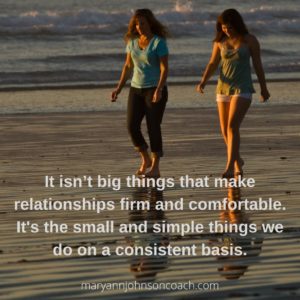 Experiments to Improve Family Relationships
Experiments to Improve Family Relationships
A few years ago, I mentored a mom who has four children. I had known this woman for a while, and we were friends. She is a great mom and a wonderful person. At one of our sessions, we talked about her relationship with her 17-year-old daughter.
My friend was answering some thoughtful questions about “how” she is when she is with her daughter. She realized that she was often too critical and that their conversations were usually about chores and schoolwork even though her daughter has things she wants to share. The seventeen-year-old wanted to talk with her mom but she didn’t seem to know when the time was right. She chose to share when her mom was working, getting ready to go somewhere, or helping another child. They wanted to spend more time together, but they were both often tired and on edge. To avoid blow-ups they avoided each other.
Experimenting With Making a Change
When mentoring I often ask my client to pick one or two things that they would most like to see changed in the relationship with someone that matters to them. Then I ask them to come up with an experiment to see what might happen to the relationship.
I love experiments because they are just that, experiments. They are designed for the purpose of seeing if you can get a certain result by doing something new or different. Sometimes the experiment is successful and sometimes it isn’t. When you don’t get the desired result, you just design a new experiment. No failure here.
This mom came up with an experiment to increase the time she and her daughter spent talking and to decrease the time they feel tired and at odds with one another.
I want you to remember that this girl is 17, almost 18 years old. I work mostly with children from infancy to 12 or 13. Nevertheless, the mom tried using a connection technique that I teach all the time to use with children. For one week she was going to give her daughter as many random touches as she could remember.
A random touch looks like this:
• As you walk past the child you reach out and touch them in a friendly way while smiling. No conversation is necessary.
• If you see a child sitting on the couch, a bed, or any place like that, you plop down by them, lean back, and rest for 10 to 30 seconds. Then you squeeze a knee or pat a shoulder and go on your way. No conversation is necessary.
The Result of the Experiment
Here is what came out of the experiment. The relationship felt better. They spent more time together even when tired. Mom was more aware. The daughter talked and mom listened more. My friend and client said that looking at the relationship and asking questions about it helped her to be more conscientious about the fact that the relationship was more important than the management part of parenting. She also said she felt more purposeful in the relationship. She was keenly aware of what she wanted the relationship with her daughter to look and feel like.
After a few weeks of the experiment, she and her daughter had four weeks left of life as they had known it. Her daughter was graduating and moving into a new phase of life. She was leaving home to work for the summer. She and her mom decided to go to lunch once a week for the final four weeks. They were really looking forward to it despite being at odds just a few weeks earlier.
In a family, relationships trump just about everything else. How we see people matters. Our stories about them and their behavior impact how we, as adults, treat them. It doesn’t take much to “shift” a relationship into calmer and more peaceful waters. I like to remember that it isn’t the big things that make relationships firm and comfortable. It is the small and simple things we do on a consistent basis.
Questions To Ask About Your Relationship with Your Child
Here are a few questions that you can ask yourself about the relationship you have with each of your children:
• What is the primary conversation you have with the child? What are you talking about?
• What is the energy/mood between the two of you most of the time?
• What assets does the child bring to the relationship?
• Are there behaviors that block the relationship?
• What are you tolerating in the relationship? A toleration is anything that is draining your energy.
Now design an experiment to try something new. Remember that it is an experiment. You don’t know how it will turn out and that is OK. If you don’t get the result you want, design a new experiment. Like any good scientist, you will eventually find what works!

